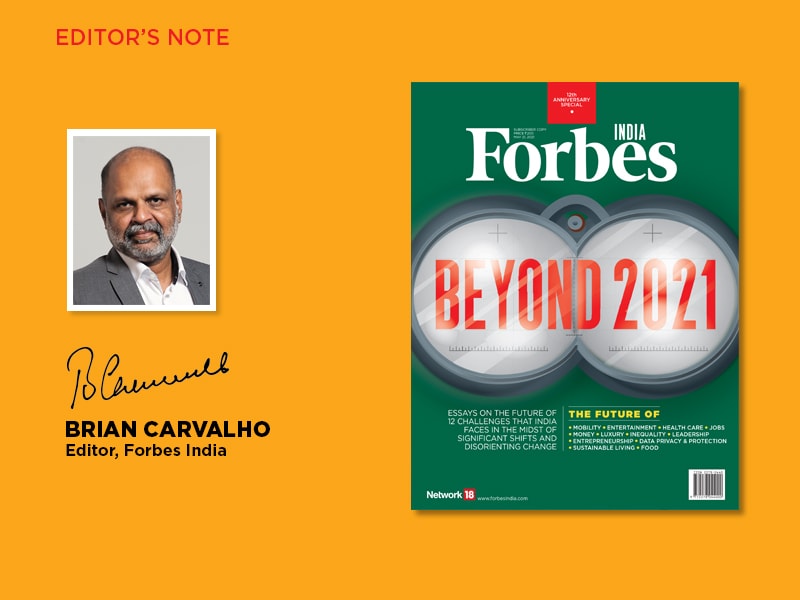#AnniversarySpecial: Imagining a brave new world
Forbes India's 12th anniversary comes at a time that calls for more retrospection than celebration, and hence our #AnniversarySpecial issue is a wealth of essays from CEOs, entrepreneurs, economists,



Writing about what will happen tomorrow can be both exhilarating and fraught with risk. Alvin Toffler perhaps did it best with his trilogy over three decades, Future Shock (1970), The Third Wave (1980) and Powershift: Knowledge, Wealth and Violence at the Edge of the 21st Century (1990), considered masterpieces for their stunning vision of how lives will change.
More recently, the Trump dispensation had thinkers delving into the future of the liberal story. Yuval Noah Harari’s 2018 tome, 21 Lessons for the 21st Century, attempted to answer several questions, from ‘What does the rise of Donald Trump signify?’ to ‘Can nationalism solve the problems of inequality and climate change?’ And Financial Times’ American commentator Edward Luce shone a light on the hazy line between illiberal democracy and autocracy in The Retreat of Western Liberalism (2017). He ends the book with the line: “We will know the difference when we see it."
Few wise men saw a pandemic coming, although many credit Bill Gates for warning in 2015 that “a microbe and not war is more likely to kill millions of people around the planet in the next 10 years". A few works of fiction did paint a grim picture of a viral outbreak, the latest being the thriller The End of October (April 2020), Pulitzer Prize-winner journalist Lawrence Wright’s novel that’s uncannily set in the spring of 2020.
So what are the lessons from the devastating pandemic for India and the years that lie ahead of its citizens? That’s one of the 12 topics the team at Forbes India shortlisted for its 12th anniversary, a moment in time that calls more for retrospection than for celebration. The team reached out to subject experts—CEOs, startup founders, economists and philanthropists, among others—in 12 areas who put forth their view on the future for their respective domains. From leadership and entrepreneurship, to inequality and wealth, to mobility and infrastructure, this collection of essays is worth poring over for its varied insights.
In his essay on how the pandemic will disrupt Indian health care, Viren Shetty, executive director & group chief operating officer of multi-speciality hospital chain Narayana Health, addresses the question that keeps many of us awake at night: “What if this pandemic never goes away?" On the brighter side, Covid-19 may well reshape people’s thinking, as most health care crises in the past have. “Through the darkest days of this pandemic, I console myself with the hope that millions of people who have lost someone to Covid are going to find their voice," writes Shetty. Don’t miss ‘Integrated Health Care, Tech Will Disrupt Sector" on page 38.
Many essays in this special issue deal with scenarios that tend to be perceived as futuristic. For instance, when painting The Future of Infrastructure, Larsen & Toubro’s MD & CEO SN Subrahmanyan drives into a world that brings “sci-fi to reality": Smart highways with neural networks, driverless cars... Are we prepared for this future or, as Toffler put it half a century ago, for a “Future Shock", or the “disease of change?"
Covid-19 is all around us, if not in us by now. Yet, it may well be the inability to cope with the disease of change that will have lifelong implications. “The acceleration of change… is a concrete force that reaches deep into our personal lives, compels us to act out new roles, and confronts us with the danger of a new and powerfully upsetting psychological disease," wrote Toffler. The Forbes India 12th anniversary issue is a small attempt to immunise ourselves against the disease of accelerated change and what looks incomprehensible today.
Best,
Brian Carvalho
Editor, Forbes India
Email:Brian.Carvalho@nw18.com
Twitter id:@Brianc_Ed
First Published: May 10, 2021, 10:33
Subscribe Now